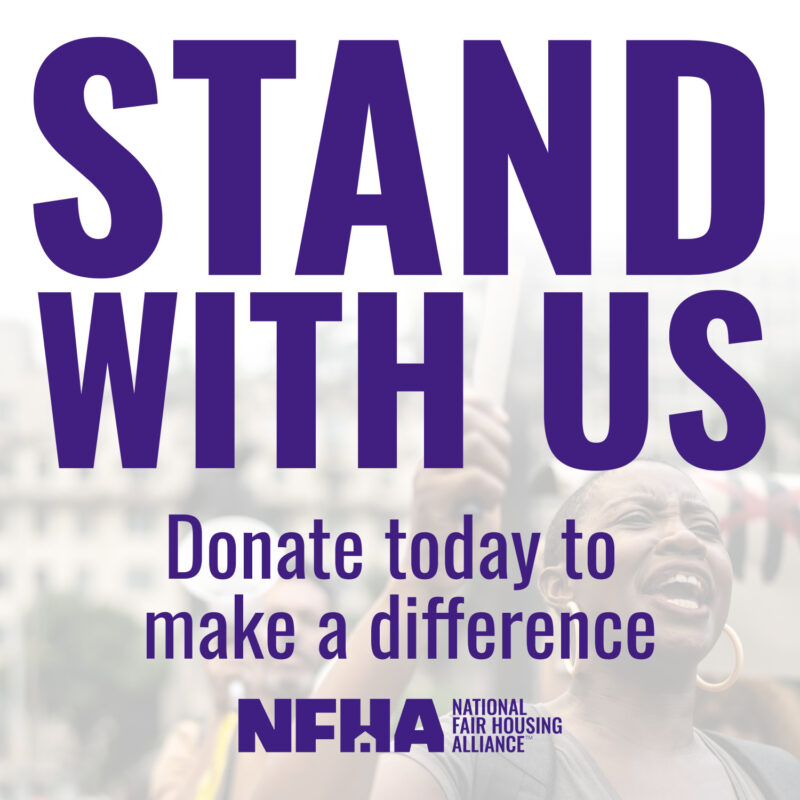New NFHA Report Outlines Disparities Related to Both COVID-19 and Fair Housing
FOR IMMEDIATE RELEASE
September 15, 2020
Contact: Izzy Woodruff | 202-898-1661 | IWoodruff@nationalfairhousing.org
New NFHA Report Outlines Disparities Related to Both COVID-19 and Fair Housing
The COVID-19 crisis has shed light on longstanding disparities in housing that have exacerbated negative health and economic outcomes in communities of color.
WASHINGTON, D.C. — The COVID-19 pandemic is a major public health issue, and its disparate outcomes reflect a host of fair housing problems as well. A new report from the National Fair Housing Alliance (NFHA) documents how the Trump administration continues to undermine enforcement of the Fair Housing Act, even while the effects of systemic housing discrimination are more pronounced because of COVID-19. The report also highlights how neighborhoods and people of color are affected adversely by climate change, the prevalence of toxic waste and other pollutants, the economic crisis, bias in technology, and much more.
The adverse COVID-19 health outcomes for people of color, and especially for Black Americans, are a manifestation of segregation and absence of opportunity in neighborhoods of color. People of color live in communities with more concrete, toxic facilities, and pollution, but fewer fresh foods or health care facilities. The disparities in economic outcomes reflect the disparities in education and job opportunities linked to differences in school quality, transportation, and employment networks.
“Even as the nation battles the triple pandemic of COVID-19, an economic downturn, and systemic racism, the Trump administration has continued its attack on fair housing laws in an effort to move this nation backward,” said NFHA president and CEO, Lisa Rice. “But NFHA is part of a movement that will not allow that. There has never been a more critical time to dig in our heels and band together to fight against the injustices directed at fair housing advocates and those we serve,” Rice added.
In its most recent and brazen attack on civil rights, the Trump administration’s Department of Housing and Urban Development (HUD) released a final rule that severely weakens the civil rights legal tool under the Fair Housing Act known as “disparate impact.” This new rule creates overwhelming obstacles to proving discrimination, puts profits above equal opportunity, and could prevent victims of discrimination from holding companies accountable for policies that perpetuate systemic discrimination.
HUD also recently unveiled its new Preserving Community and Neighborhood Choice rule, which replaces the 2015 Affirmatively Furthering Fair Housing (AFFH) regulation and guts the fundamental provisions of the Fair Housing Act’s AFFH mandate, such as eliminating discriminatory housing practices, taking active steps to end segregation, promoting integration, and ensuring that all neighborhoods are well-resourced and that their residents have access to opportunity.
Both the new Disparate Impact rule and the new rule to replace the 2015 AFFH regulation will only worsen an already bleak housing landscape brought on by the COVID-19 pandemic and economic downturn.
Here are some other key facts highlighted in the report:
- Rental housing-related complaints in 2019 accounted for 83.75 percent of all transaction types reported.
- Complaints alleging discrimination on the basis of disability continued to constitute the largest percentage of complaints at 58.90 percent, followed by race-based complaints at 16.47 percent, and familial-status based complaints at 7.71 percent.
- The gap in homeownership rates between Blacks and Whites, at 30 points, is back to where it was in 1890.
- The number of housing discrimination complaints in 2019 declined from a 25-year high in 2018 but remained significant in 2019 at 28,880.
- Private fair housing organizations continued to process more complaints, 73.12 percent, than all government agencies combined.
Despite the challenges outlined in the NFHA report, there have been some notable steps toward progress. Fair housing organizations and others brought important housing discrimination cases in 2019 to confront injustice and won significant victories in cases designed to bring redress for discrimination in metro areas throughout the U.S.
The following recommendations are among several in the report designed to bring the nation closer to achieving housing justice:
- Congress must pass protections for homeowners and renters to prevent loss of housing caused by the COVID-19 pandemic and economic crisis.
- HUD must immediately rescind its new Disparate Impact rule and reinstate the 2013 regulation.
- HUD must rescind its Preserving Community and Neighborhood Choice rule, reinstate the 2015 regulation, and resume its implementation and enforcement.
- HUD must conduct research into the nature and extent of sexual harassment in housing situations.
This report, like NFHA’s previous annual reports, compiles data from private, nonprofit fair housing organizations and government agencies from throughout the country to provide a snapshot of the nation’s fair housing enforcement activities and critical issues in fair housing. NFHA has collected this data since 1995.
###
About The National Fair Housing Alliance
Founded in 1988, NFHA is a consortium of more than 200 private, nonprofit fair housing organizations and state and local civil rights agencies from throughout the United States. Headquartered in Washington, D.C., NFHA works to eliminate housing discrimination and ensure equal housing opportunity for all people through leadership, education, outreach, membership services, public policy initiatives, community development, advocacy, and enforcement.
